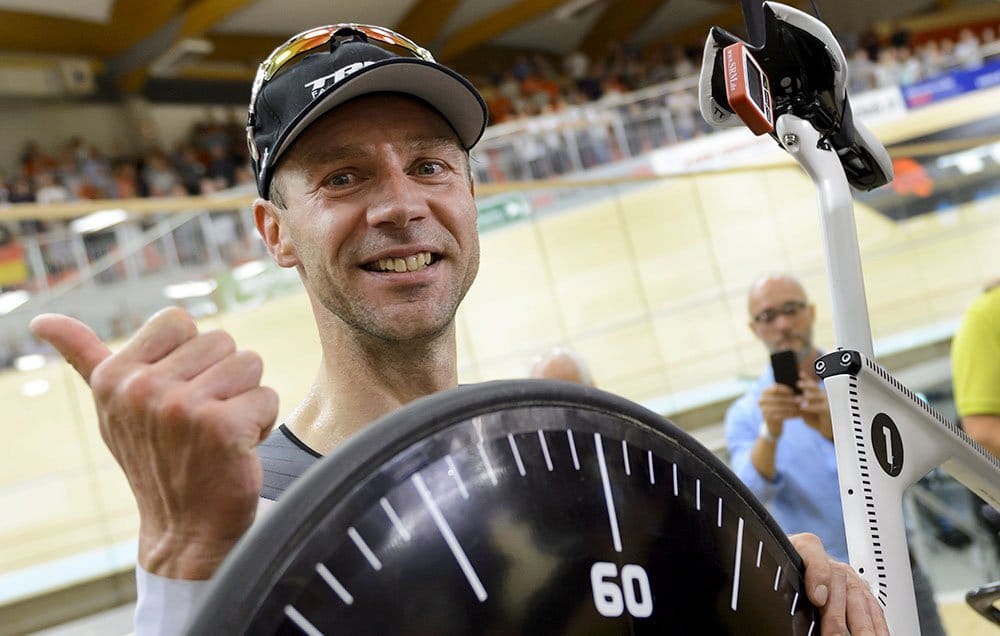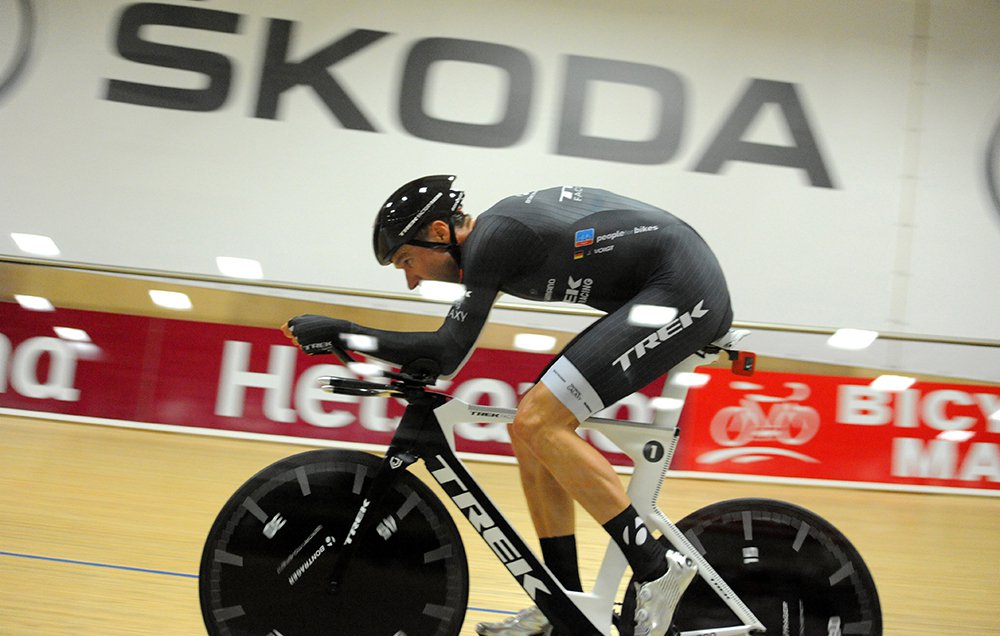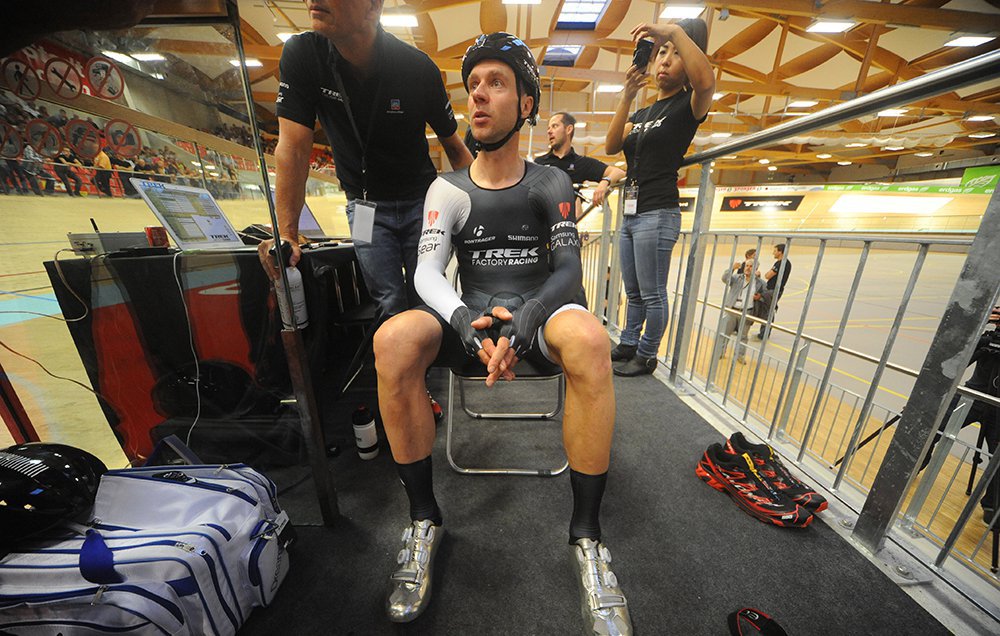A Peek Inside Jens Voigt’s New Autobiography
(This is an excerpt from Shut Up, Legs: My Wild Ride On and Off the Bike, Jens Voigt's new autobiography written with James Startt. The book spans his entire cycling career, from his early days to breaking the hour record. Below is Jens' story of breaking the record, and what retiring from cycling meant for him.) - by Jens Voight

“…things can always go wrong. You can have a puncture. You can start out too fast. You can just have a bad day. Hey, you can even have two punctures. If I’d learned one thing over the years, it was that nothing was a given in bicycle racing.”
In the morning, I did a short ride and a stretching session. Then in the afternoon, I just relaxed. Early in the evening, I went on the track and did a good warm-up ride. We let the crowd in at about 7:00pm, and I hit the track with Daniel Gisiger, riding behind his derny scooter. We did two 30-minute sessions. It was very relaxed, no stress. And then on the second one, we slowly built up the speed before I finally did the last two laps all-out by myself, just to prepare the body for what was coming up.
Then it was back to the locker room to towel off and get into the special skinsuit and all the other special equipment.
I think it’s safe to say that I was nervous. I was really excited, but yes, also nervous. I knew that after all my specific training and testing, I should have been able to break the record, but there’s always that little bit of anxiety. After all, I knew that I wasn’t as strong as I had been five or eight years before. Plus, things can always go wrong. You can have a puncture. You can start out too fast. You can just have a bad day. Hey, you can even have two punctures. If I’d learned one thing over the years, it was that nothing was a given in bicycle racing.
And let’s not forget that I was racing in front of a full house of fans. The Velodrome Suisse can seat 1,800 spectators. My parents were there. Bobby Julich was there. Jens Wichmann, one of the best men at my wedding, was there. Eurosport was broadcasting it in 75 countries to four to five million people, and more were following the stream online. So there was no place to hide. Of course, I was nervous. I felt the pressure, and I felt responsibility.
In the minutes before I started, I just tried to focus. I closed my eyes and focused on all the details that I had practiced the entire month before—my position, my breathing, staying on the black line. And while doing this, I was blocking out the crowd, the broadcast, everything. I couldn’t let anything distract me. It was only when Daniel said, “Okay, Jens, one minute,” that I opened my eyes again, took a deep breath, and stepped out onto the track and onto my bike.
As soon as the gun went off, I tried to focus my effort on getting up my cruising speed without building up too much lactic acid. Knowing how emotional I can be, I had to be careful not to go out too fast and end up in the red zone. That, too, was something we had practiced many times, and it was one of the points where I was probably most vulnerable. But after five or six minutes, I got a sense that I was on or possibly even ahead of schedule.
“There was no reason to hold back. This was it! This was the last race of my life, the last all-out effort I would do for the rest of my life.”
According to the UCI rules, I was not allowed to have a computer or any electronic apparatus that would allow me to see my progress. The only person allowed on the track was Daniel Gisiger. He had a whistle that he would blow on each lap when I should be crossing the start line. That worked out well, because despite all the people and all the cheering, I could always hear Daniel’s whistle. I needed a point of reference, but it was important for me to keep it as low-tech as possible because I didn’t have much time for analytical thought while I was out there! Mostly I just had to follow my body and monitor my breathing and pedal cadence to make sure I was in control of my effort. After a month of training, I had a pretty good idea of how my body felt at race effort.
I also compiled a little playlist that I rode to, to help push me along. I can’t remember the entire playlist and didn’t hear it half the time. But I do remember that I started with “Ready to Go” by Republica and finished with “The Final Countdown” by Europe. The playlist was very theme oriented, as every song had something to do with cycling or my last ride.
But I did hear the crowd. I understood later that they gave me a standing ovation for much of the hour, especially in the last 20 minutes. To be honest, I couldn’t see them while I was out on the track, because it would have taken too much effort to move my head and turn it to the side. But I could hear them. And I could feel them!

I separated the attempt into three 20-minute segments. I knew I was ahead of schedule after the first 20 minutes and was worried that I might be going into the red, so I backed off a bit in the second 20 minutes. And then, in the last 20 minutes, I just really opened it up. By that point, I knew I was two-and-a-half or three laps ahead of the record, and I knew that I was in control and that I wasn’t going to go into the red. And the last 10 minutes were all about blurring out and just giving everything I had left. By that point, my biggest concern wasn’t the hour record, but the enormous saddle sore that was burning my butt! Everything I could physically feel was in pain.
With a few laps to go, I knew I had the record. Yet, I still went as hard as I could to raise the bar a little higher and to really give it all I had. There was no reason to hold back. This was it! This was the last race of my life, the last all-out effort I would do for the rest of my life.
Already, in the middle of the most intense hour of my life, it hit me that a major life change was coming my way. But I pushed that thought back as far as I could. There was no time to wax philosophical here. Soon it would be a time to celebrate with my family and friends.
When the gun finally sounded, I instantly felt a burden lift from my shoulders. First there was the immediate burden of pain that I was in. There was just an immense sense of relief after racing for a full hour in that cramped-up position. Everything was aching. My neck ached from holding my head low in that aerodynamic position. My elbows hurt from holding my upper body in that position. My lungs hurt after burning and screaming for oxygen for so long. My heart hurt from the constant pounding. My back was on fire, and then there was my butt! I was really and truly in a world of pain.
“I looked at myself in the mirror for a second and just thought, Okay, I will never be this fit, strong, skinny, and well trained for the rest of my life, never ever! It’s only downhill now.”
But another burden also lifted: the burden of constant suffering, sacrifice, and stress; of training and racing hard; of risk taking; of missing my family; of chasing another contract for another year. I must have had the biggest and happiest smile on my face for the next two laps, the time it took me to slow down, before landing in the arms of my teammates and parents. Everybody was smiling and hugging. It was a rare moment of pure happiness.
It was crazy. I ran across the track, jumped over the barriers, and started hugging random strangers. I was giving high fives and taking a million selfies with my fans.
Then we had the ceremony with UCI president Brian Cookson in which I was awarded a certificate saying that I was the official world record holder. Me! Stupid little Jensie was the official UCI world-record holder!
After the anti-doping control, my team prepared a place where I could officially hang my bike up for good. I still have that photo of me putting my bike into retirement. Then I went back to my room and showered. Alone for the first time with no more soundtrack, no family, no team, fans, or cameras, I just sat on my bed for a while and let it all sink in. I just sat back as a steady stream of images flashed through my mind.

I thought about winning exactly 65 races. I thought about crashing at least 75 times. I thought about my 17 Tours de France. I thought about seeing some of my best friends succeeding and winning races. And I thought about losing my friend and teammate Wouter Weylandt in a fatal crash.
I won a lot of races in my career, but I lost far more. Still, I always knew I was in a lucky position to turn my passion into my profession. And now, at 43, I was closing the largest chapter of my life. Something I’d done passionately for 33 years had come to an end. Getting out to the shower, I looked at myself in the mirror for a second and just thought, “Okay, I will never be this fit, strong, skinny, and well trained for the rest of my life, never ever! It’s only downhill now.” I just passed the highest point of my physical strength and fitness. I will never, ever be Tour de France fit again, period! That was hard to swallow.
But, again, there was happiness and pride, because I finished my career on a high note. I finished my career with the support of my friends, family, and team. And I finished it on my own terms, which I knew was critical to my peace of mind moving forward.
Knowing what I know today, I probably backed off too much in the middle 20 minutes of the record. Chris Boardman once said, regarding the hour record, “If it’s easy to hold your speed, then you’re going too slow.” And in the middle section, I would say I played it too conservatively. But I was still just ecstatic once I crossed the line. What a great night. What a great event. What a great way to end a career!
READ MORE ON: industry Jens Voigt People

